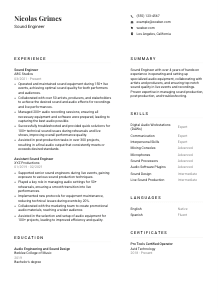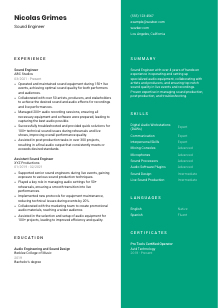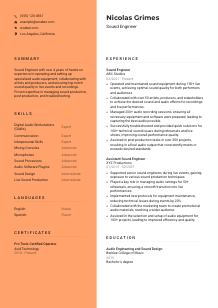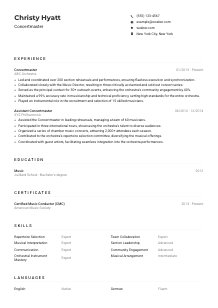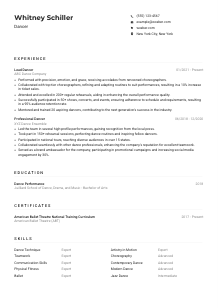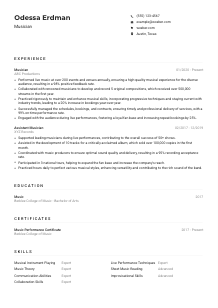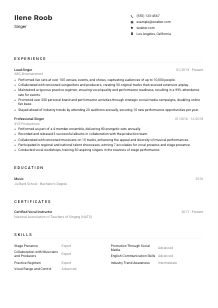Sound Engineer CV Example
Fine-tuning frequencies, but your CV sounds off-key? Delve into this Sound Engineer CV example, modulated with Wozber free CV builder. Learn how to fine-tune your audio acumen to resonate with job requirements, harmonizing a career mix that hits all the right notes!
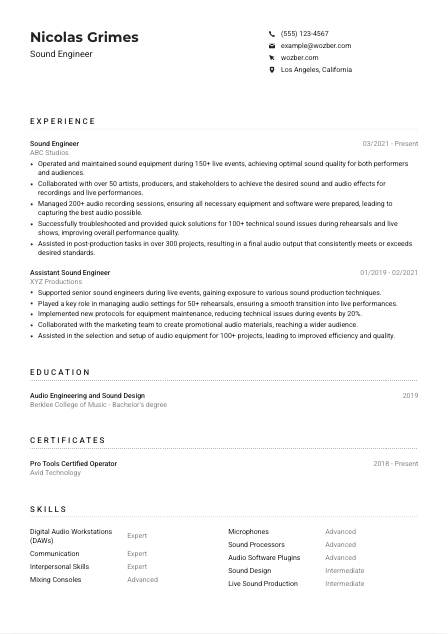
How to write a Sound Engineer CV?
Hey there, aspiring Sound Engineer! You're about to embark on a thrilling journey to tailor your CV in perfect harmony with your dream job. In the competitive landscape of sound engineering, your CV is not merely a document; it's a powerful mixtape of your professional saga. Using Wozber's free CV builder, let's craft a CV that hits every note flawlessly, leveraging ATS-optimisation and an ATS-friendly CV template to ensure your application sings to the top of the pile.
Ready to amp up your career? Plug in, turn up the volume, and let's rock this!
Personal Details
Like the first track on an epic album, your Personal Details section sets the stage for the hiring manager's journey through your CV. Let's orchestrate it to make every note count, ensuring your intro strikes a chord with your future employer.
1. Your Name: The Headliner
Consider your name the headliner of your CV – it should grab attention. Employ a clear, legible font, letting your name take center stage, a beat ahead of the rest in size. Remember, you're the star of this show.
2. The Perfect Sound Engineer Label
Directly beneath your name, position the title 'Sound Engineer' to instantly dial into the hiring manager's frequency. This clarifies your desired role and aligns your CV with the job posting from the get-go.
3. Tuning into Contact Info
"Phone Number: Ensure your number is in tune and typo-free. Professional Email Address: Create a simple, professional email format like firstname.lastname@emailprovider.com, avoiding quirky or unprofessional handles."
4. Location: Setting the Stage
"As the job demands Los Angeles-based talent, listing your city and state, ‘Los Angeles, California', harmonizes with this key requirement and ensures no discord over relocation."
5. Amplifying Your Online Presence
If relevant, a LinkedIn profile or personal website showcasing your portfolio can be like an encore to your CV – offering more depth to your professional narrative. Ensure it's fine-tuned to reflect the same information as your CV.
Takeaway
Your Personal Details are the initial beats to the rhythm of your professional story. Craft them with intention, making sure they're harmonized with the Sound Engineer role you're tuning for. Think of this section as setting the tone for the stellar performance that follows.





Experience
The Experience section is your career's greatest hits album, showcasing tracks that resonate with your audience – the hiring team. Here, we'll marshal your past performances to illustrate why you're the headliner they've been searching for.
- Operated and maintained sound equipment during 150+ live events, achieving optimal sound quality for both performers and audiences.
- Collaborated with over 50 artists, producers, and stakeholders to achieve the desired sound and audio effects for recordings and live performances.
- Managed 200+ audio recording sessions, ensuring all necessary equipment and software were prepared, leading to capturing the best audio possible.
- Successfully troubleshooted and provided quick solutions for 100+ technical sound issues during rehearsals and live shows, improving overall performance quality.
- Assisted in post‑production tasks in over 300 projects, resulting in a final audio output that consistently meets or exceeds desired standards.
- Supported senior sound engineers during live events, gaining exposure to various sound production techniques.
- Played a key role in managing audio settings for 50+ rehearsals, ensuring a smooth transition into live performances.
- Implemented new protocols for equipment maintenance, reducing technical issues during events by 20%.
- Collaborated with the marketing team to create promotional audio materials, reaching a wider audience.
- Assisted in the selection and setup of audio equipment for 100+ projects, leading to improved efficiency and quality.
1. Curating Your Hits
First, dissect the job description, highlighting experiences that align with sound operation and maintenance, collaboration, and post-production tasks. This ensures you're singing the right tune from the start.
2. The Band Members: Roles and Companies
"Chronologically list your gigs, leading with your most recent act. For each role, include your job title, the name of the venue (company), and the dates of your engagement, setting the stage for your accomplishments."
3. Headlining Accomplishments
"Detail your career highlights and responsibilities that reflect the job's rhythm, such as ‘Operated and maintained sound equipment during 150+ live events'. Quantify your achievements to amplify their impact."
4. Volume Control: Quantifying Success
Wherever possible, turn up the volume on your contributions with numbers and specifics, making the impact of your performances palpable. Numbers not only add credibility but also give the hiring manager a taste of the sold-out shows you could lead.
5. Focused Setlist
Tune out irrelevant experiences. If it doesn't contribute to the Sound Engineer narrative, it's just noise. Ensure every bullet point reinforces your candidacy for the role, keeping the setlist tight and impactful.
Takeaway
Imagine the hiring manager seated in the audience, eagerly awaiting your performance. Your experience section is your time to shine, to show them why you're the act to follow. With each tailored accomplishment, you're not just hitting the notes – you're making them feel the music. That's the kind of performer who gets an encore.
Education
While your experience takes center stage, your education is the backstage pass that got you here. It's the foundation of your sound, the training ground where you honed your craft. Here's how to spotlight your education in perfect pitch with the role.
1. Identifying Your Genre
Kick things off by aligning your degree with the role's requirements. For instance, 'Bachelor's degree in Audio Engineering, Sound Design or related field' resonates perfectly with our gig's prerequisites.
2. Setting the Stage
Structure this section with clarity and brevity: list your field of study, degree, alma mater, and the curtain call (graduation date), ensuring the spotlight hits where it counts.
3. Hitting the Right Notes
If you have the specific degree listed in the job description, such as 'Bachelor's degree in Audio Engineering and Sound Design', ensure it's front and center, singing in harmony with the Sound Engineer role you're eyeing.
4. Bonus Tracks
Point out relevant coursework or projects only if they add depth to your application, especially early in your career. While not essential for our CV, they can be instrumental in others.
5. Additional Accolades
If you've snagged any academic awards or took part in clubs or societies that fine-tuned your sound engineering prowess, don't shy away from giving them a shoutout. Remember, the stage is yours.
Takeaway
Your education section isn't merely a formality; it's the linchpin that secures your foundation in sound. Tailoring it to match the employer's score ensures your CV plays the right tune, leaving the hiring team eager for your debut.
Certificates
In the mix of qualifications, certificates are your sound check, proving your gear is tuned and ready to rock. They're badges of honor, underlining your commitment to stay on the cutting edge of sound engineering. Time to make them echo.
1. The Headliners
"Recap the job description closely. For positions like our Sound Engineer role, where specific certs aren't listed, priority should be given to those that enhance your credibility and expertise in sound engineering."
2. Amplifying Relevance
Choose certifications that truly resonate with sound engineering: think Pro Tools, Logic Pro, or Avid Certification. These not only catch the eye but also signal a harmony between your skills and the job's demands.
3. Soundwaves in Time
Note the date of acquisition for recent certs to highlight your ongoing commitment to tuning your skills, especially in a domain that evolves as rapidly as audio technology.
4. Keeping Your Instruments Tuned
The tech landscape is always changing, so keep your certifications up to date and your knowledge fresh. Continuous learning and development are key to staying ahead in the sound engineering game.
Takeaway
Your certifications are your solo performance in the orchestration of your CV. Each one is a note that reinforces the harmony of your skills and experience. Curate them with care, and they'll sing volumes of your dedication and expertise to prospective employers.
Skills
The Skills section is where you dial in the frequencies, bringing clarity and emphasis to your professional toolkit. For a Sound Engineer, this is where your technical prowess and soft skills harmonize, creating a sound that's distinctly you.
1. Scrutinize the Track List
Start by isolating both explicit and implicit skills in the job posting. For our Sound Engineer position, highlight proficiency in DAWs, mixing consoles, microphones, sound processors, communication, and collaboration.
2. Crafting Your Set
Align your inventory of skills with what the role demands. Prioritize those that resonate most, such as 'Expert in Digital Audio Workstations (DAWs)' or 'Advanced knowledge of mixing consoles,' rounding out with interpersonal and communication skills.
3. Volume Levels
Resist the urge to crank everything to eleven. Keep your list focused and concise, spotlighting skills that will make the hiring manager take notice. The goal is to create a mix that's both impressive and relevant.
Takeaway
Your skills section should sing with precision and power. By carefully aligning your abilities with the job's requirements, you're ensuring that you're not only heard but listened to. And in the competitive field of sound engineering, being listened to is half the battle won.
Languages
In the global concert of commerce, your ability to sing in multiple languages can catapult you onto the world stage. Even if direct interaction in other languages isn't in the day-to-day tune of a Sound Engineer, showcasing multilingualism is akin to holding encore performances worldwide.
1. Checking the Setlist
"Review the job posting for language specifics. For our role, 'Fluent English speaking and writing' was a necessity, setting the baseline for our communications gear."
2. Headlining Languages
"Lead with the languages most critical to the role. If English is a must, like in our job example, it takes top billing on your CV, highlighted as 'Native' or 'Fluent.'"
3. Supporting Acts
Even if additional languages weren't mentioned, listing them can embellish your profile. They're the unexpected solos that grab attention and show versatility.
4. Sound Levels
Be clear about your proficiency level for each language, using terms like 'Native', 'Fluent', 'Intermediate', and 'Basic' to set expectations correctly.
5. Global Access
Consider the broader scope of your role and the potential for growth. Your linguistic skills could open up new markets and opportunities, turning your CV into a passport for worldwide ventures.
Takeaway
While your core responsibility as a Sound Engineer might not involve linguistic prowess, showcasing your language skills adds an extra layer of richness to your professional profile. It speaks to your ability to communicate in the diverse and global field of sound engineering, making your CV resonate on a worldwide scale.
Summary
Your summary is the opening act, setting the stage for the detailed performance to follow. It's a brief solo that showcases your career highlights, inviting the audience to lean in and listen closely to your professional story.
1. Decode the Playlist
Dive deep into the job requirements, teasing out key points that you can mirror in your summary, creating resonance from the very start.
2. Stepping onto Stage
Begin with a punchy intro that encapsulates who you are professionally. Let it echo with your experience, painting you as the adept Sound Engineer you are.
3. Sound Bites
Integrate a few of your top skills and notable achievements within the industry. This isn't the place for the full discography but a teaser that promises more.
4. The Perfect Pitch
Keep your summary tight and illuminating, a concise 3-5 lines that invite the hiring manager to explore the depth of your experience and skills. Envision it as the hook of your favorite song – unforgettable and leaving them wanting more.
Takeaway
As the lights dim, your summary should leave the hiring team intrigued, setting the tone for what's to come. By deeply understanding the job and tailoring your response, your CV becomes more than words on paper – it becomes the start of your next great adventure in the world of sound engineering.
Raising the Curtain: Your CV Takes Center Stage
And there you have it – a backstage pass to creating a CV that doesn't just hit the right notes but leaves the crowd roaring for an encore. With Wozber's free CV builder, ATS-compliant CV, and ATS-friendly CV template, you're not just ready to apply; you're ready to headline. Dive into your personal symphony, fine-tune each section, and don't forget the ATS optimisation with Wozber's ATS CV scanner.
The stage is set, the crowd is waiting, and your career as a Sound Engineer is about to soar. Let's take that leap together and make music that the whole world will want to listen to.

- Bachelor's degree in Audio Engineering, Sound Design or related field.
- Minimum of 3 years of experience in live sound production or studio recording.
- Proficiency in operating and setting up specialized audio equipment, including mixing consoles, microphones, and sound processors.
- Strong knowledge of digital audio workstations (DAWs) and audio software plugins.
- Excellent communication and interpersonal skills to collaborate with artists, producers, and other team members.
- Fluent English speaking and writing skills necessary.
- Must be located in Los Angeles, California.
- Operate and maintain sound equipment during live events, ensuring optimal sound quality for both performers and audiences.
- Collaborate with artists, producers, and other stakeholders to achieve the desired sound and audio effects for recordings and live performances.
- Manage audio recording sessions, ensuring all necessary equipment and software are prepared to capture the best audio possible.
- Troubleshoot technical sound issues and provide quick solutions during rehearsals and live shows.
- Assist in post-production tasks such as mixing, editing, and mastering to ensure final audio output meets the desired standards.





